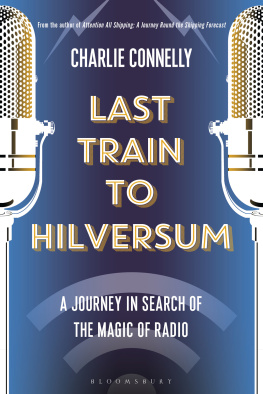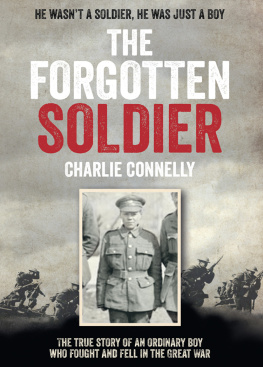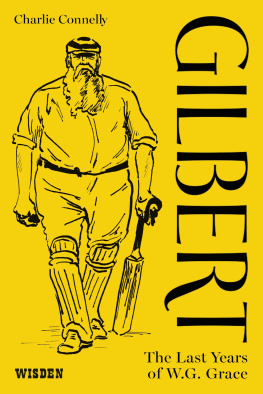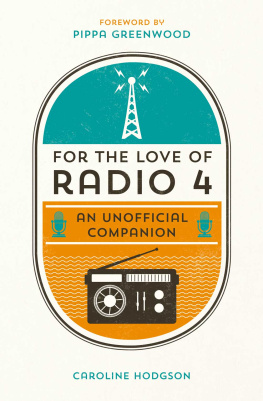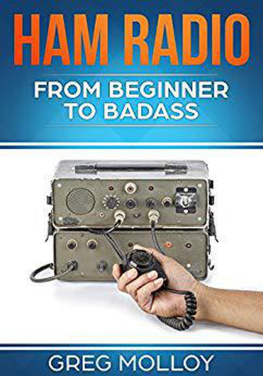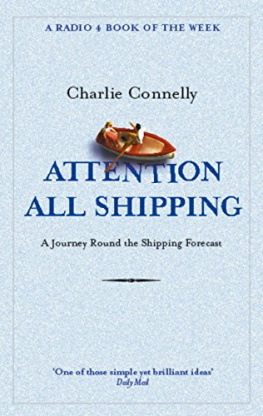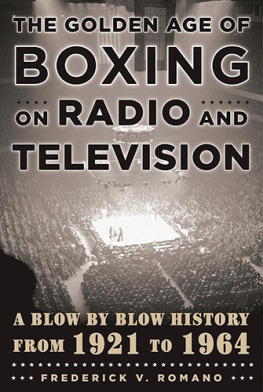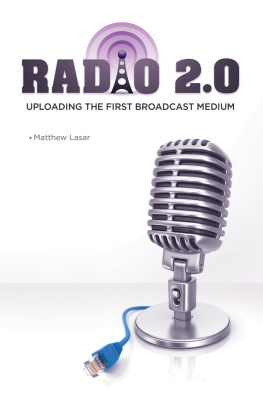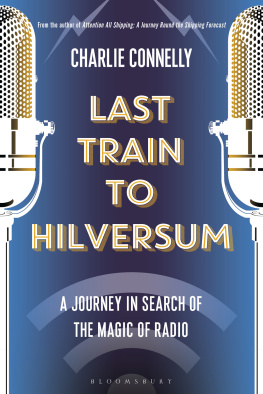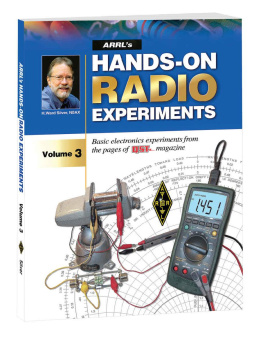
As one who, walking in the twilight gloom,
Hears round about him voices as it darkens,
And seeing not the forms from which they come,
Pauses from time to time, and turns and hearkens;
So walking here in twilight, O my friends!
I hear your voices, softened by the distance,
And pause, and turn to listen, as each sends
His words of friendship, comfort, and assistance.
Henry Wadsworth Longfellow

Contents
Its always an honour to publish a book with Bloomsbury and Im mightily grateful to everyone there for all their invaluable input in turning a great big wobbling mountain of words into the book you now hold in your hands. To Charlotte Croft, Allie Collins, Ian Preece and Holly Jarrald, James Watson and Jude Drake a great big smackeroo on the cheek, a curt nod or a hearty high-five, whichever they prefer.
Im immensely grateful to Charlotte Atyeo for her friendship, relentless enthusiasm for and passionate advocacy of Last Train to Hilversum from its earliest stages.
Customary but never less than glittering thanks are due to the worlds greatest agent Lizzy Kremer and her inestimable colleagues Harriet Moore and Maddalena Cavaciuti at David Higham Associates.
Simpering gratitude goes out to all those who submitted themselves to interview in the preceding pages without whom, well, youd have just been stuck with me droning on through the whole thing, for one thing. Thank you Corrie, Dotun, Cerys, Arthur, Sandee, Alex, Charlotte, Bas and Jessie for your time and insights.
David Prest, head honcho of Britains finest independent radio production company Whistledown Productions, has been a good friend and constant source of generous advice and encouragement to me on and off the airwaves for many years, but I dont think Ive ever said thanks. So... thanks.
Im also grateful to the following splendid folk for their assistance, company, advice, opinions, memories, eye-rolling at yet another obscure radio anecdote, and strong drink when needed in some cases a combination of all of these. In no particular order: Thomas de Bruin, Liz Buckley, Dale Shaw, Richard Courtice, Tom Teasdale, Kevin Dawson, Harry Graham, Hannah Bushell, Constance Ratazzi, Gary Bales, Angela Clarke, Miles Hunt, Bernard Sumner, Sen Street, Steve Morgan, Dan Berlinka, Seb Emina, Karina Buckley, Sheryl Garratt, Mark McGuire, Peter Finch, Lorcn Leavy, Abigail Rieley, Jasper Copping, Sinad Gleeson, James Pennock, Chris Skudder, Claire Deakin, David Parsons, Marie Parsons, Liz Campbell, Erica Nockalls, Catherine Rotte Murray, Ian Darby, James Brown, Dan Donnelly, Eero Hmeenniemi, Colm Tobin, Roy Clare, Eleanor Tiernan, Daisy Buchanan, Michael Grant, Mike Gerrard, Maura Foley, Allison Burke, Lee Watt, Rosita Boland, Samira Ahmed, Jim Kimberley, Isobel Kimberley, Paddy Courtney, Matt Kelly, Perry Bartlett, A.J. Lampe, Nadine OHare, Barrie Birch, Sam Bryant, Nigel Bryant, Mark Warren, Melissa Shales, Penelope Shales Slyne, Richard Thomas, Alan Townsend, Fritz Hermann, Alex Ratcliffe, Kate Morrish, Tom Muckian, Margaret Blake and Maria Boyle.
As ever, the largest chunk of gratitude goes to Jude, without whom, well, Id have starved long before the deadline for a start. No one could be a bigger, better or more relentlessly cheerful and loving support.
This being a radio book I should probably finish in the traditional manner by saying hello to anyone else who knows me.
We are all radio people. I am, you are, the postman is; those two lads over there in the van, that woman with the toddler in the buggy, the old lady next door. All of them, all of us, radio people. According to Radio Joint Audience Research, the independent body that measures radio audiences in Britain, 90 per cent of the adult population listens to the radio every week. Not once a year or a couple of times a month: every week. Thats 48.9 million of us, according to RAJAR figures released at the start of 2018, racking up a billion hours a week of radio in our cars, workshops and kitchens, on our transistors and DAB radios, through our phones, laptops and digital televisions. Just about all of us are listening to the radio every week whether were tuning in to the shipping forecast or an urban grime pirate station. Sixty per cent of us listen at home, a quarter of us listen in the car, the rest of us have the radio on while were working, all helping to register a frankly astonishing weekly average of 21.3 hours per listener.
These are barely believable statistics and Im keen to know who the ten per cent not listening to the radio are, the weirdos especially considering how much more we pick and choose what media we consume and access it at our own convenience these days. Despite the prevalence of podcasts, streaming and the playlists we construct for our mp3 players, radio is still everywhere. Its the oldest broadcasting format in the world (although the kind of radio we listen to today is still less than a hundred years old) yet its battering through the twenty-first century stronger than ever, adapting to and embracing new technologies while never losing that sense of being the box of voices, the reassuring portal to the world in the corner of the room or the centre of the dashboard.
Lets not forget too that were not paying a penny for the billion hours of radio were listening to every week either. Radio, whether its the BBC or commercial, is completely free. While television rifles your pockets for access to many of its wonders there is no concept of subscription radio or pay-per-listen. Even BBC radio is free: while the corporations services are funded by the licence fee, you only have to have a licence if youre watching television. Get rid of your telly, stop paying for a licence and nobodys going to come hammering on your door for sticking on Chris Evans in the morning, or pull you over to rat-a-tat-tat on your drivers window for singing along at the wheel to New Order on 6 Music (unless your singing is particularly rotten).
Radio brings the world right into our homes and doesnt ask a penny for it. The news, live football matches, the weather forecast, concerts, documentaries, a new band youve never heard before, every ball of a Test match taking place on the other side of the world, that song you had played at your wedding... its there if you want it and its all yours for nothing. Nothing .
At the same time, podcasts and listen again notwithstanding, radio is probably the last media and entertainment outlet we consume from which we cede control almost completely. Were much choosier about television, becoming less and less likely to allow our viewing to be dictated by the published schedule. In the age of the boxed set and series record buttons the days of parking in front of Blue Peter and just watching whatevers on all the way through Home and Away , Top of the Pops , Coronation Street and Sportsnight are long gone. Instead well flick around the programme guide to see if theres anything on, catch up with the Marcella we recorded the night before, or the Saturday night BBC Four Scandinavian drama, then spend at least half an hour scrolling through Netflix trying to find something we want to watch. Yet still were more likely to put on the radio and succumb to the disembodied voices that fill the room or the car, especially if were doing something else with the radio on in the background. If its our local station therell be news and phone-ins relevant to where we are and we might learn some snippet of local history, whats on at the comedy club in town at the weekend and why someone called Dave thinks Brexit will be brilliant for the minicab firm by the railway station. On Radio 4 well hear a politician squirm, listen to a documentary about poetry, and a drama we dont really understand, but well leave it on anyway, while on a music station well hear a brilliant band weve never heard before, Google them and buy their album from Bandcamp.

